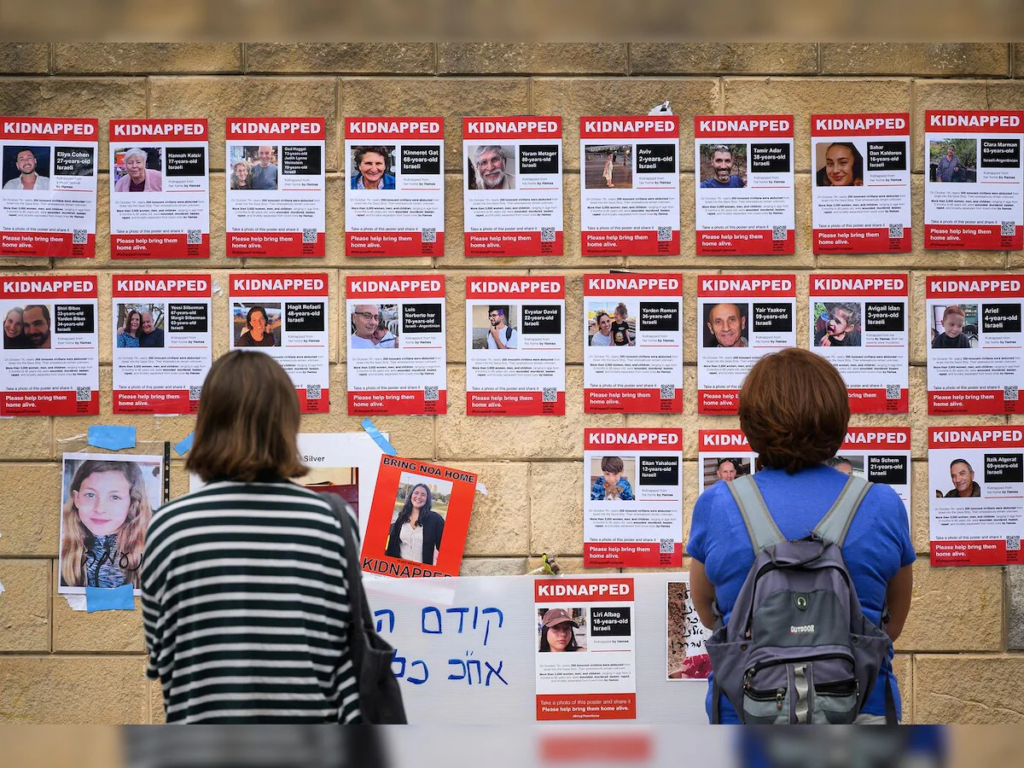During a recent visit to Gaza, Israeli Prime Minister Benjamin Netanyahu made a bold and unprecedented announcement: a $5 million reward for anyone who provides credible information leading to the rescue of Israeli hostages held by Hamas and other militant groups in the region.
Alongside the financial incentive, Netanyahu assured safe passage out of Gaza for individuals and their families who cooperate with Israeli authorities.
This offer marks a significant escalation in Israel’s efforts to recover hostages abducted by Hamas and other terror groups during the October 7 attacks.
To facilitate this initiative, a dedicated platform has been launched, highlighting the names and details of the hostages and offering multiple avenues for communication. While this approach underscores the urgency of the situation, it also raises questions about its effectiveness and ethical implications.
The $5 Million Reward: An Unprecedented Offer
The announcement of the $5 million reward underscores the lengths Israel is willing to go to secure the return of its citizens. Netanyahu’s statement, “Whoever brings us a hostage will find an open door for himself and his family to leave,” highlights a strategy aimed at incentivizing Gazans to provide actionable intelligence.
The financial reward, combined with the promise of safe passage, is designed to appeal to those living under the influence of Hamas or in dire economic conditions.
To operationalize this plan, Israel has launched a simple Arabic-language website called Machtoffin (“captives” in Arabic). The site serves as a central hub for gathering intelligence on hostages, featuring photographs, names, and other details of individuals believed to still be held in Gaza. Visitors to the site can contact Israeli authorities through WhatsApp, Telegram, or dedicated phone lines to provide information.
דניאל בירנבאום, מנכ"ל חברת סודהסטרים לשעבר במסר למי שמחזיקים בחטופים בעזה:
— 🎗️🇮🇱חגית קלימן – Hagit Klaiman🇮🇱🎗️ (@klaiman14) October 19, 2024
פרס כספי בסך 100 אלף דולר לכל מי שידאג להשבתו בחיים של חטוף או חטופה ישראלים. שתפו pic.twitter.com/t2UAEXs0vZ
However, the website has faced criticism for inaccuracies, including the inclusion of individuals who have already been rescued or whose bodies have been recovered. For instance, the site lists Farhan al-Qadi, who was rescued in August, and Noa Argamani, freed in June.
Read : Turkey Cuts All Ties with Israel: Erdogan’s Bold Stand
Six hostages whose bodies were found in a Gaza tunnel also remain listed. These discrepancies raise concerns about the platform’s reliability and whether these inaccuracies could hinder efforts to obtain credible information.
Reward-Based Initiatives: A History of Limited Success
This is not the first time Israel or its citizens have offered monetary incentives for information on hostages. In October, former SodaStream CEO Daniel Birnbaum pledged $100,000 for any Gazan who could secure the return of an Israeli hostage.
The offer was widely publicized through a video with Arabic subtitles, which provided direct contact information for those willing to cooperate.

While these initiatives demonstrate Israel’s commitment to recovering hostages, they have yet to yield significant results. Analysts attribute this to multiple factors, including the difficulty of obtaining accurate intelligence in a conflict zone and the logistical challenges of executing rescue operations. The socio-political landscape of Gaza, where fear of retribution from Hamas is pervasive, further complicates these efforts.
Additionally, Hamas has maintained a tight grip on the hostages, using them as bargaining chips in negotiations with Israel. In a weeklong truce in late November, Hamas released 105 civilians, underscoring the strategic value of hostages in the ongoing conflict. However, this has also reinforced the challenges of relying on reward-based systems to recover individuals in such a volatile environment.
The Human Toll and the Path Forward
The plight of the hostages and their families remains a deeply human tragedy at the heart of this geopolitical conflict. Of the 251 hostages abducted on October 7, 97 are believed to remain in Gaza. This includes at least 34 individuals confirmed dead by the Israel Defense Forces (IDF). Additionally, Hamas continues to hold two Israeli civilians and the bodies of two IDF soldiers from earlier conflicts in 2014 and 2015.

The hostages’ conditions are often dire, with limited access to medical care, food, and basic necessities. The psychological toll on their families is immeasurable, as they navigate a harrowing wait for news of their loved ones. For these families, every new initiative, no matter how unorthodox, represents a glimmer of hope in an otherwise bleak situation.
While monetary rewards and technological platforms may play a role in gathering intelligence, they are unlikely to be the sole solution to this complex crisis. A multi-faceted approach that combines diplomatic negotiations, military strategies, and humanitarian efforts is essential for addressing the hostages’ plight comprehensively.
Prime Minister Netanyahu’s $5 million offer to Gazans marks a bold attempt to recover hostages and alleviate the suffering of their families. However, its success will depend on the accuracy of the information provided and the ability of Israeli forces to act on that intelligence. As the conflict continues to unfold, this initiative serves as a stark reminder of the human cost of war and the lengths nations will go to protect their citizens.

